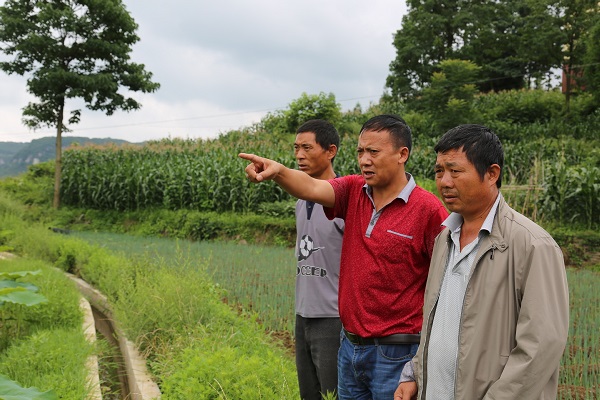Party chief gives village a prosperous future


Zuo Wenxue (middle), Party chief of Tangyue village, Guizhou province, inspects crop harvests at local farms. [Photo provided to China Daily]
Towering above Tangyue village is a sign reading: "Poverty gives rise to the desire for change". It is a Chinese idiom that has been driving the village's sweeping development.
The village lies in Anshun, Southwest China's Guizhou province. Just six years ago, it was a national-level impoverished village, with an annual income per capita of less than 4,000 yuan ($565).
In 2014 a flood hit the village, causing substantial damage to the fields, the houses and the roads, but the year also marked the beginning of the village's revitalization.
Zuo Wenxue, born in 1971, has been the Party chief of Tangyue village since 2002. He is a major contributor in helping the village transform into one of the most iconic examples of poverty alleviation today.
Zuo used to own a wood-processing factory and has one of the most well-to-do households in the village, but he decided to become a village cadre and work for the collective interests of its residents.
"I often told our cadres that it doesn't really matter how much money you earn. It's how much you have done that matters. As long as your family is provided for, you should do something for your hometown and society," Zuo says.
After the flood, Zuo and other village leaders decided to adopt a new approach to resuscitate the village effectively.
The village had only 40,000 yuan in total, so the 11 cadres together took a loan of 1,100,000 yuan and established a cooperative. The villagers were encouraged to join the cooperative and transfer their farmland for collective use, and the earnings were distributed in dividends at the end of each year.
Within the first year, the cooperative earned 860,000 yuan from growing lotus roots, and more villagers were attracted to join the cooperative.
The village also set up a construction team, a transportation team and a career center to offer villagers more job opportunities. Before the establishment of the cooperative, around nine hundred villagers left the village looking for work. Today the number is less than 50.
By the end of 2019, the collective revenue of Tangyue village exceeded 6,380,000 yuan and the revenue per capita reached 20,140 yuan.
As a deputy to the 13th National People's Congress, Zuo brought to this year's two sessions a range of suggestions to attract young talent to work in the countryside.
He proposed emphasizing countryside education and improving the welfare of university graduates working as village cadres.
"To consolidate the hard-won achievements in poverty alleviation, we must improve the employment policies so that talent is willing to come and stay in the countryside," Zuo says.
Peng Yuanke, head of Tangyue village, has been working with Zuo for seven years. He says that without Zuo, the village would not have become what it is today.
"He is a very democratic leader. When it comes to anything in the village, big or small, he always discusses it with the team. He closely monitors the village's development and deals with things objectively," Peng says.
Since the COVID-19 outbreak, Zuo has worked hard to strike a balance between disease prevention and local economic development.
The villagers are encouraged to sell the local agricultural products through online platforms, and as a result, Zuo says that the local economy has not been substantially affected.
The village is now building a processing plant, a handbag factory and a clothing factory. Upon completion, the factories are predicted to provide around a thousand jobs for the six neighboring villages.
In the near future, Zuo aims to establish a research base and build guest houses, to turn Tangyue village into a travel destination for both learning and leisure.
MOST POPULAR
Editors' Picks
 Infographic:
China's NEV industry performance review
Infographic:
China's NEV industry performance review
 Infographic:
China's low-altitude economy: A transformative force
Infographic:
China's low-altitude economy: A transformative force
 Infographic:
China's development in culture, tourism industries
Infographic:
China's development in culture, tourism industries
 Infographic:
China's major developments in 2024
Infographic:
China's major developments in 2024



